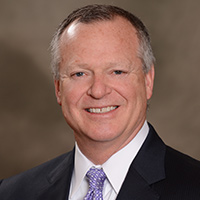Reflections on a year like no other for the healthcare industry

Joseph J. Fifer
- The pressing issues facing healthcare generally haven’t changed much in recent years, but 2020 shined a new spotlight on issues of equity and brought a staggering public-health crisis.
- Frontline healthcare workers deserve our appreciation, as do many others in the industry who have worked tirelessly to meet the demands of this moment.
- Looking back on the year from a healthcare perspective, there are reasons to be grateful.
The more things change, the more they stay the same, or so the saying goes. And it has held true for U.S. healthcare — until 2020.
In a meeting I participated in recently with leaders of other major healthcare associations, someone pointed out that the topics on the agenda centered on the same fundamental issues we had discussed five years previously.
That comment resonated with me. At times, the industry seems to be taking two steps forward and one step back as healthcare stakeholders and policymakers grapple with longstanding challenges like embracing consumerism and reining in healthcare spending growth on a societal level. I have been beating the drum on consumerism, in particular, throughout my tenure at HFMA.
These and other evergreen issues certainly have not gone away. But this year other issues have demanded our attention.
The national agenda shifted
One such issue — diversity and inclusion — isn’t new. But the events of summer 2020 shined a spotlight on it, and there is reason to hope that racial inequities will now be prioritized appropriately throughout our society. Within healthcare, leaders can make a difference by committing to build a diverse and inclusive workforce and working to identify racial disparities that could exacerbate financial barriers to receiving care
The other issue in the spotlight this year — COVID-19 — is definitely new. And it has proved to be the biggest public-health challenge in living memory.
Along with others throughout the world, Americans are adjusting to the constraints of a pandemic-year holiday season. The coronavirus, no longer “novel,” continues to spread, with surge upon surge. Efforts to avoid stretching hospital capacities to the breaking point have compelled many city and state officials to impose strict limitations on business activities and social gatherings. And new challenges are bound to arise as our nation prepares to implement the biggest vaccination campaign in its history.
The healthcare community deserves our gratitude
Back in April, when New York City was the epicenter of the virus in the U.S., a nightly ritual played out on the city’s balconies and rooftops. At 7 p.m., like clockwork, residents clapped their hands, banged pots and pans and made music to express their gratitude to frontline healthcare workers who risked their lives every day to fight a disease they were encountering for the first time.
As the months dragged on and the virus found its way to every corner of the country, pandemic fatigue took hold in more ways than one. The public displays of gratitude ended. But the appreciation from those whose lives were touched by highly skilled and compassionate COVID-19 caregivers endures.
To the thanks of patients and their loved ones, I want to add my own — not only to the first responders and frontline physicians, nurses and other clinicians, but to everyone who works in healthcare. My daughter is a physician assistant on the front line, so I have heard the stories and seen the strain in her eyes. But there are many others whose efforts should be applauded.
I thank the supply chain specialists, who go the extra mile to source the all-important personal protective equipment and other necessities; the revenue cycle team members, who seek to make the financial experience smoother and easier for patients during this stressful period, in many cases while working from home for the first time; accountants and financial analysts, who are trying to make financial sense of the senseless; finance and clinical leaders, who have collaborated on adapting care models and facilities to meet unprecedented demands; and the many and diverse members of healthcare teams.
Last but not least, my thanks go to all who have supported HFMA as we worked to adapt more of our education and information offerings to a virtual environment.
Looking ahead to a brighter future
We may reflect on this year with sadness for the lives lost and the hardships experienced, both directly and indirectly, because of the pandemic. At the same time, we can be grateful for the resilience of our hospitals and health systems, the talent and dedication of our healthcare workforce and the lives that have been saved as a result.
The year 2020 will always be remembered as the year the pandemic began; 2021 is shaping up to be the year it is brought under control. Five years from now, I won’t be surprised if we are still dealing with familiar, longstanding industry challenges. But with hard work, and a little luck, the worst of the pandemic will be long behind us. Wishing all of you a happy — and healthy — holiday season and new year.





